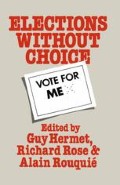Abstract
With sporadic exceptions, political scientists concentrate upon supposedly free and competitive elections while they loftily ignore those in which one candidate gains 99 per cent of the votes. The approach which justifies this bias in research is well known. On the one hand, holding free and competitive elections is accepted as a sign of pluralist democracy;1 on the other hand, political science conceives itself as being primarily concerned with multi-party systems and with competitive elections. Postulating that one-party elections or other types of state-manipulated ballots are necessarily rigged leads to their being denied any significance. This removes the political scientist’s obligation to examine how rigged these elections really are, or to consider the implications of electoral politics so dissimilar from the liberal democratic model.
Access this chapter
Tax calculation will be finalised at checkout
Purchases are for personal use only
Preview
Unable to display preview. Download preview PDF.
Notes
Marx, La Guerre civile en France, 1871 (Paris: Editions Sociales, 1968) p. 214
Joseph A Schumpeter, Capitalism, Socialism and Democracy, 2nd edition, (New York: Harper and Brothers, 1947) p. 282.
A. Downs, An Economic Theory of Democracy (New York: Harper and Brothers, 1967) p. 295.
9.see Richard Rose, ‘On the Priorities of Citizenship in the Deep South and Northern Ireland’, Journal of Politics, xxxviii (1976) 247–91.
J. Wiatr, ‘Elections and Voting Behavior in Poland’, in Essays on the Behavioral Study of Politics, ed. A. Ranney (Urbana, Ill.: University of Illinois Press, 1962) p. 251.
See the suggestive facts on the predominance of ‘non-classical’ elections collected in R. Rose and H. Mossawir, ‘Voting and Elections: A Functional Analysis’, Political Studies, xv, no. 2 (1967) 180–2.
John S. Saul, ‘The Nature of Tanzania’s Political System: Issues Raised by the 1965 and 1970 Elections’, Journal of Commonwealth Political Studies, x, no. 2 (July 1972) 113–29
Goran Hyden and Colin Leys, ‘Elections and Politics in Single-Party Systems: The Case of Kenya and Tanzania’, British Journal of Political Science, 11, no. 4 (Oct 1972), 389–420
J. D. Barkan and J. J. Okumu, ‘Political Linkage in Kenya: Citizens, Local Elites and Legislators’, report presented to the loth Annual Assembly of the American Political Science Association, 1974
Denis Martin, ‘La Houe, la maison, l’urne et le maître d’école: Les élections en Tanzanie, 1965–1970’, Revue française de science politique, xxv, no. 4 (1975) 677–716.
G. A. Fiechter, Le Régime modernisateur du Brasil 1964–192 (Leyden: A. W. Sijthofi, 1972) pp. 220 ff.
Editor information
Editors and Affiliations
Copyright information
© 1978 Guy Hermet
About this chapter
Cite this chapter
Hermet, G. (1978). State-Controlled Elections: A Framework. In: Hermet, G., Rose, R., Rouquié, A. (eds) Elections Without Choice. Palgrave Macmillan, London. https://doi.org/10.1007/978-1-349-03342-3_1
Download citation
DOI: https://doi.org/10.1007/978-1-349-03342-3_1
Publisher Name: Palgrave Macmillan, London
Print ISBN: 978-1-349-03344-7
Online ISBN: 978-1-349-03342-3
eBook Packages: Palgrave Political & Intern. Studies CollectionPolitical Science and International Studies (R0)

